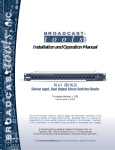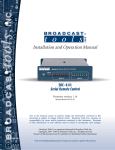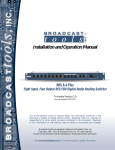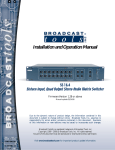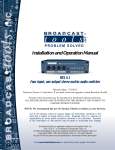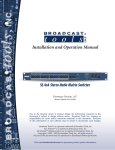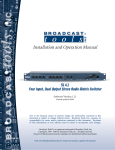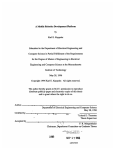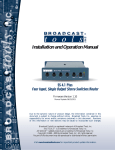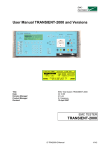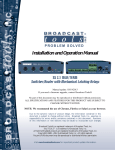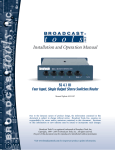Download Broadcast SRC-32 Specifications
Transcript
INC ® Installation and Operation Manual SRC-32 Serial Remote Control Firmware version: 1.21 or greater Manual Revised: 07/31/07 Due to the dynamic nature of product design, the information contained in this document is subject to change without notice. Broadcast Tools, Inc., assumes no responsibility for errors and/or omissions contained in this document. Revisions of this information or new editions may be issued to incorporate such changes. Broadcast Tools® is a registered trademark of Broadcast Tools, Inc. Copyright, 1989 - 2005 by Broadcast Tools, Inc. All rights reserved. No part of this document may be reproduced or distributed without permission. Visit www.broadcasttools.com for important product update information. SRC-32 Installation and Operation Manual Table of Contents Section Title Page # Introduction . . . . . . . . . . . . . . . . . . . . . . . . . . . . . . . . . . . . . . . . . . . . . 3 Safety Information . . . . . . . . . . . . . . . . . . . . . . . . . . . . . . . . . . . . . . . . 3 Who to Contact for Help . . . . . . . . . . . . . . . . . . . . . . . . . . . . . . . . . . . 3 Product Description . . . . . . . . . . . . . . . . . . . . . . . . . . . . . . . . . . . . . . . 4 Front Panel Description . . . . . . . . . . . . . . . . . . . . . . . . . . . . . . . . . . . . 4 Installation Guidelines . . . . . . . . . . . . . . . . . . . . . . . . . . . . . . . . . . . . . 5 Specifications . . . . . . . . . . . . . . . . . . . . . . . . . . . . . . . . . . . . . . . . . . . 12 Warranty. . . . . . . . . . . . . . . . . . . . . . . . . . . . . . . . . . . . . . . . . . . . . . . 13 CONTENTS e-mail: [email protected] v o i c e : 360.854.9559 fax: 866.783.1742 2 SRC-32 Installation and Operation Manual INTRODUCTION Thank you for your purchase of a Broadcast Tools® SRC-32, Serial Remote Control (referred to as the SRC-32 throughout this manual). We’re confident that this product will give you many years of dependable service. This manual is intended to give you all the information needed to install and operate the Broadcast Tools® SRC-32. SAFETY INFORMATION CAUTION! Broadcast Tools® Products, as with any electronic device, can fail without warning. Do not use this product in applications where a life threatening condition could result due to failure. Only qualified personnel should install Broadcast Tools® products. Incorrect or inappropriate use and/or installation could result in a hazardous condition. WHO TO CONTACT FOR HELP If you have any questions regarding your product or you need assistance, please contact your distributor from whom you purchased this equipment. NOTE: This manual should be read thoroughly before installation and operation. If you would like more information about Broadcast Tools® products, you may reach us at: Broadcast Tools, Inc. 131 State Street Sedro-Woolley, WA 98284 USA Voice: 360.854.9559 Fax: 866.783.1742 WEBSITE: Internet Home Page: www.broadcasttools.com E-mail: [email protected] THANK YOU FOR CHOOSING BROADCAST TOOLS® BRAND PRODUCTS! Visit our web site for product updates and additional information INTRODUCTION e-mail: [email protected] v o i c e : 360.854.9559 fax: 866.783.1742 3 SRC-32 Installation and Operation Manual PRODUCT DESCRIPTION The Broadcast Tools® SRC-32 is a computer interface to the real world. Connected through an RS-232 or RS-422/485 serial port the SRC-32 can notify your PC software program that any of the 32 opto-isolated inputs has been opened or closed and allows your software to control 16 - SPDT, 1-amp relays and an additional 16 open collector outputs. Communication with the SRC-32 can be accomplished via short “burst” type ASCII or binary commands from your PC (computer mode). Also, two units can be operated in a standalone mode (master/slave mode) to form a "Relay extension cord," with 32-channels of control in each direction. The unit can communicate using RS422/485 or RS232, at data rates up to 38400. The SRC-32 may be expanded to 128 inputs x 128 outputs. Optional external Ethernet capabilities may be added by the purchase of the SP-1. The SRC-32 is supplied with a 16 x 2 LCD display to indicate the status of both the inputs and outputs. A push button switch allows LCD display selection of either inputs or outputs. Three front panel LED’s display power, input or outputs along with the LCD contrast control. Removable (Euro) screw terminals are provided for ease of wire installation/removal. Set-up: Connect the supplied 12-vac power supply. When the SRC-32 is powered, the LCD will momentarily display the version of firmware programmed into the flash microprocessor and the current baud rate setting. The default baud rate setting is 9600, 8, N, 1. The baud rate can be set to 2400, 9600, 19200 or 38400 (other baud rates may be supplied). This can be done using either the ASCII or binary command formats listed below. Inputs can be simple contact closures or completely optically isolated with your external trigger sourcing current to the opto-isolators. See page 11 for details on jumper settings to configure the inputs and relays. The RS-232 serial connection is made either through the RJ-11 or male DB-9 connector. JP09 is used to reverse the RS-232 transmit and receive pins and is normally set in the “RR” position. The SRC-32 is supplied with a modular cord and DB-9 female to modular adapter (S9). The male DB-9 is used to connect to an external modem. RS422/485 connections are made on the terminal block. FRONT PANEL DESCRIPTION The front panel allows the user to select either inputs or outputs to be displayed on the LCD. The third front panel switch from the left is used to select inputs and outputs. The “input” LED will light when the LCD is displaying the status of the inputs and the “output” LED will light when displaying output status. When an output is off, a “0” will be shown and when it is on a “1” will display. The front panel LCD displays the first 16 I/O from left to right on the top row and 17 through 32 from left to right on the bottom. The user has the option of how an input is displayed. Inputs are normally “high” when in the off state and pulled down to “0” when a contact is closed. If you are monitoring TTL inputs, you may want to keep the display in this format to display the true sense of the input. If you are monitoring contact closures, you may want to have a “1” appear when the contact is closed and a “0” when it is open. If this is the case, turn on DIPswitch position 8. The green “Power” LED will light when the SRC-32 has power connected. DESCRIPTION e-mail: [email protected] v o i c e : 360.854.9559 fax: 866.783.1742 4 SRC-32 Installation and Operation Manual INSTALLATION GUIDELINES DIP Switch Settings: Multiple SRC-32’s can be “daisy chained” together using a single serial port to a PC and the 10 pin IDC “EXT” headers marked “EXT-1” and “EXT-2”. The EXT-2 from one SRC-32 can be connected to the EXT-1 of the next and so on. Each board should have a unique address set on its DIPswitch address setting. Up to three additional, SRC-32’s may be connected together so that up to 128 inputs can be monitored and 128 outputs controlled from one PC’s com port, other serial devices or the external Ethernet option. The SRC-32 connected to the PC is considered the “Master” unit and must have its address at zero and jumper JP13 set to RS-232 or RS-422/485 depending on the PC connection. Each external SRC-32 should have a non-zero address of 1,2 or 3. The external “Slave” SRC-32 needs to have JP13 set to “External”. NOTE: After changing Dipswitches, be sure to press the reset switch or recycle the power. NOTE: DIP 1, 2 The board address is set using Dipswitch numbers 1 and 2 in normal hex format: 1, 2 00 = 0 (master) No polling is required for status. 01 = 1 10 = 2 11 = 3 After changing a DIPswitch setting, the board must be reset by pressing the “RST” button or by cycling the power. DIP 3, 4 = Set baud rate 3, 4 00 = 9600 01 = 2400 10 = 19200 11 = 38400 WEBSITE: Baud rate will be set by the DIPswitches on power up or reset. It can also be changed using the serial port commands at other times, but if the SRC-32 is reset, the baud rate will be set according to the DIP settings. Visit our web site for product updates and additional information DIP 5 = (ON) Hex mode – When on, hex “Burst” mode is selected. Refer to the protocol below for hex commands. (Off) is ASCII mode. Refer to the ASCII protocol below for ASCII commands. DIP 6 = (ON) Pair mode, inputs from one SRC-32 will map directly to outputs of another SRC-32 when connected together via RS-232 or RS422. (OFF) normal operation via RS-232/422. DIP 5 must also be ON, as pair mode only works in hex mode. DIP 7 = (ON) Modem mode. (Not yet implemented) Set master to address 00 and slave to 01. Master will output an AT command to an external modem and call the slave. Also set DIP 5 and 6 ON for hex pair mode. INSTALLATION e-mail: [email protected] v o i c e : 360.854.9559 fax: 866.783.1742 5 SRC-32 Installation and Operation Manual DIP 8 = (ON) Invert sense of LCD display of inputs. A closed contact will display as a “1” and an open as a “0”. (OFF) A closed contact will display as a “0” and an open as a “1”. NOTE: After changing DIP settings, be sure to press the reset button or recycle the power. SRC-32 ASCII Serial Burst Mode Commands: The burst mode allows a computer or ASCII terminal to control and interrogate the unit. This section defines all burst mode commands. Dipswitch 5 must be off for the ASCII commands to be received. Each burst mode command starts with an asterisk (*). Next is a single decimal digit that corresponds to the unit (ID) address 0-3. Following are one or more ASCII characters specifying the command. A carriage-return is required to terminate each command. If the command requested a response, the response will consist of an upper case S, followed by the unit address, and then the specific response. If acknowledgments are enabled, successful commands are responded to with RRR while errors get an EEE response. The syntax of each command is given below. The syntax shows the command exactly as it should be sent, except that lower case characters represent values that should be substituted: Character String u ii rr Meaning Unit ID Input Number Output Number Allowable Values 0-3 01-32 01-32 SRC-32 ASCII Commands: *uC4x- Set RS-232/RS-422/485 mode timings: x = 1, Turn ON RS-232/RS-422/485 mode NO delays on sending data. x = 0, Turn OFF RS-232/RS-422/485 mode (delay for the RS-232 charge pump startup before sending response). *uCCx- Set Serial Speed. x = 0: 2400 1: 9600 2: 19200 3: 38400 *uCEx - Enable Error and Good Responses- Where x = Y to enable and x = N to disable. In this mode, when a command is sent that is in error, the unit will reply (possibly before receiving the entire command) with “EEE.” If the command is sent correctly, the unit will reply with “RRR.” *uCAxxx…x - Load AT command string for modem init. (future feature) *uCTxxx…x - Load Telephone number for modem to dial if set to master in modem mode. (Future feature) INSTALLATION e-mail: [email protected] v o i c e : 360.854.9559 fax: 866.783.1742 6 SRC-32 Installation and Operation Manual Output Control Commands: *uORrrL*uORrrF*uORrrPtt- Latch Output rr, (output number 01-32). 01–08 are relays, 09–32 open collectors Unlatch Output rr, (output number 01-32). 01–08 are relays, 09–32 open collectors Pulse Output rr, (output number 01-32). Pulse Length tt: 0099 corresponds to 00 - 9.9 Seconds. 01–08 are relays, 09–32 open collectors ASCII Information Retrieval Commands: *POLL - Respond with unit (ID) address in appropriate time slot. If there are multiple units on the line, each will respond with a different delay after receipt of this command. *uSPii - Send status of input ii. Response is SuP,ii,x where x is 1 if the corresponding input is high, 0 otherwise. *uSPA - Send status of all inputs. Response is SuP,A,x,x,x,x,x,x,x,x,x,x,x,x,x,x,x,x --> 31<CR><LF > where input 1 is first and input 32 is last. x is 1 if the corresponding input is high, 0 otherwise. *uSR - Send status of all OUTPUTS. Response is: SuA,x,x,x,x,x,x,x,x--->32<CR><LF> *uU - Send Unit Information :<name(SRC-32)><version><cr><lf> *SA - Send current AT command string for modem. *ST - Send current telephone number for modem to dial. SRC-32 Binary Serial Burst Commands: WEBSITE: Visit our web site for product updates and additional information Dip switch 5 must be on for binary commands to be processed. All commands start with a 2Ah (ASCII *). The first byte contains the board ID and the byte count iiibbbbb Byte count is number of bytes after the byte containing the byte count including checksum. The second byte contains an 8-bit command. Some commands are followed by data bytes. Checksum is the LSByte of the sum of all bytes preceding checksum including start. Binary commands must be received as a packet. If 50 ms or more passes after a character is received with no new character following, the SRC-32 will begin looking for a new string if no valid data packet has been received. INSTALLATION e-mail: [email protected] v o i c e : 360.854.9559 fax: 866.783.1742 7 SRC-32 Installation and Operation Manual Pair Mode The SRC-32 can be used to transmit the outputs from one unit to another over a serial connection. The logical sense of the inputs is inverted when written to the outputs of its corresponding unit. Normally inputs are high and when closed go to a logic 0 when in pair mode. When logic 0 is received, it will write logic 1 to the output. This allows the relays connected to outputs 1-8 to come on if its corresponding input is closed. Multiple units can also be set up to communicate with the same number of units on the other end of a data link. All units must have DIPswitches 5 and 6 turned on and the unit addresses must have a corresponding unit on the other end of the link set to the same address. For example, if you have two units on each side set to address 0 and 2, then the two units on the other side of the data link must also be set to 0 and 2. All units will automatically transmit the states of their inputs on power up, every ten seconds and when any input changes states. If a unit does not receive an update from its corresponding paired unit for a period of 20 seconds, its LCD display will begin to flash “COM - FAILURE”. As soon as communications is restored, the “COM – FAILURE” message will clear. Command Additional Data Bytes Function SRC-32 Binary Commands: 40h RS-232 timer off 41h RS-232 timer on 42h Set serial speed to 2400 43h Set serial speed to 9600 44h Set serial speed to 19200 45h Set serial speed to 38400 46h Enable error & good responses 47h Disable error & good responses 48h N Latch output n (00 – 1F) 49h N Unlatch output n (00 – 1F) 4Ah Nt Pulse output n (00 – 1F), t= time (1-63h =.1 - 9.9sec) 4Bh N Poll output n (00 – 1F) (see 55h) 4Ch N Poll input n (00 – 1F) (see 55h) 4Dh All Output status request (see 52h) 4Eh All Input status request (see 53h) 4Fh Unit version request (see 54h) Special Binary Commands for Modem Operation: Future feature Load AT command string for modem init. Future feature Load Telephone number for modem to dial if master Future feature Request for stored AT command (56h response) Future feature Request for stored telephone number (57h response) Binary Output Response from SRC-32: 60h nnn…n Load AT command string for modem init. (Future feature) 61h nnn…n Load Telephone number for modem to dial if master (Future feature) 62h Request for stored AT command (56h response) (Future feature) 63h Request for stored telephone number (57h response) (Future feature) e-mail: [email protected] v o i c e : 360.854.9559 fax: 866.783.1742 INSTALLATION 8 SRC-32 Installation and Operation Manual Command Additional Data Bytes Binary Output Response from SRC-32: 50h 51h 52h Nnnn 53h 54h N 55h N 56h nnn…n 57h nnn…n Function Error response if enabled by 46h Good response if enabled by 46h Response of 4Dh, outputs are sent as 4 bytes, 8 outputs per byte with the order being MSByte sent first, LSByte sent last. Response of 4Eh, inputs are sent as 4 bytes, 8 inputs per byte with the order being MSByte sent first, LSByte sent last. Response to 4Fh outputs version, (ie 13h = ver1.3) Response to 4Bh or 4Ch for polled output or input and used to notify when an input changes state, here the three highest bits of n are used to identify if an input/output is low/high and the lowest 5 bits identify the input or output. n = 00h – 1Fh if input n is low, n = 20h – 3Fh if input n is high, n = 40h 5Fh if output n is low and n = 60 – 7F if output n is high. n=cccnnnnn where ccc = 000 = input low, 001 = input hi, 010 = output lo, 011 = output hi. nnnnn lowest 5 bits used to identify the input or output. Response to 62h with stored AT command (Future feature) Response to 63h with store telephone number (Future feature) Example of Binary Exchange: To poll the output status of board 2 when outputs (0-31) 0, 6, 10 and 31 are high, all else low: Binary Command 00101010b 01000010b 01001101b 10111001b String 2Ah 42h 4Dh B9h to SRC-32: Start byte Board ID 2 (010b), Byte count 2 (00010b) All Output Status Request Check sum (2Ah+42h+4Dh=B9h) Binary Response 00101010b 01000101b 10000000b 00000000b 00000100b 00000010b 01000001b String 2Ah 45h 80h 00h 04h 02h F5h from SRC-32: Start byte Board ID 2 (010b), Byte count 5 (00101b) MSByte sent first WEBSITE: Visit our web site for product updates and additional information LSByte sent last Check sum (2Ah+45h+80h+00h+04h+02h=F5h) INSTALLATION e-mail: [email protected] v o i c e : 360.854.9559 fax: 866.783.1742 9 SRC-32 Installation and Operation Manual Input jumper configuration: The SRC-32’s inputs may be configured for one of three operations: 1 – Optically isolated wet source (5 to 24 vdc) 2 - Optically isolated dry (5-volt source) 3 - CMOS/TTL 5-volt compatible input Fu n c t i o n “ A” In p u t Ground “ B” In p u t Source side of Opto-Isolator (Cathode) “ A” j u m p er 1&2 “ A” j u m p er 3&4 “ B” J u m p er 2&3 Optically Isolated w et source Anode of the Opto-Isolator (2.2K) Cathode of Opto-Isolator 2&3 N/C 2&3 TTL/CMOS compatible 5- v o l t l o g i c Ground Logic input with pull-up 1&2 3&4 1&2 Optically Isolated d r y c o n t ac t s Relay jumper configuration: The SRC-32’s relays may be configured for normally open or normally closed contacts. The SRC-32 is shipped configured for normally open contacts. To configure for normally closed contacts, move the jumper from the NOx position to the NCx position. x refers to the relay number. There are sixteen relays installed in the SRC32. These jumpers are located between the relays and front panel connectors. It is recommended that all cables connected to the SRC-32 should be looped through ferrite cores to suppress RF. Surge protection with RF filtering such as the Tripp Lite “ISOBAR 4” is also suggested for the power transformer. The purchase of an inexpensive uninterruptible power supply (UPS) will provide back up in case of power outages. Check out our web site for lightning protection links. CAUTION! Installation of the SRC-32 in high RF environments should be performed with care. Shielded cable is suggested for all control, audio inputs and outputs. All shields should be tied to the “CHASSIS GROUND” terminals. The station ground should be connected to the chassis ground screw (CH1) located near J13 as viewed from the rear. For lightning protection devices, check out www.polyphaser.com and www.itwlinx.com. WEBSITE: Visit our web site for product updates and additional information INSTALLATION e-mail: [email protected] v o i c e : 360.854.9559 fax: 866.783.1742 10 SRC-32 Installation and Operation Manual Removable (Euro) screw terminal connections. Connector Position: Top-1 Bottom-1 In-1A In-4A In-1B In-4B In-2A In-5A In-2B In-5B In-3A In-6A In-3B In-6B Top-2 Bottom-2 In-7A In-10A In-7B In-10B In-8A In-11A In-8B In-11B In-9A In-12A In-9B In-12B Top-3 Bottom-3 In-13A In-16A In-13B In-16B In-14A In-17A In-14B In-17B In-15A In-18A In-15B In-18B Top-4 Bottom-4 In-19A In-22A In-19B In-22B In-20A In-23A In-20B In-23B In-21A In-24A In-21B In-24B Top-5 Bottom-5 In-25A In-28A In-25B In-28B In-26A In-29A In-26B In-29B In-27A In-30A In-27B In-30B Top-6 Bottom-6 In-31A OC-19 In-31B OC-20 In-32A OC-21 In-32B OC-22 OC-17 OC-23 OC-18 OC-24 Top-7 Bottom-7 GND OC-30 OC-25 OC-31 OC-26 OC-32 OC-27 GND OC-28 K1-A OC-29 K1-B Top-8 K2-A K2-B K3-A K3-B K4-A K4-B Bottom-8 K5-A K5-B K6-A K6-B K7-A K7-B Top-9 Bottom-9 K8-A K11-A K8-B K11-B K9-A K12-A K9-B K12-B K10-A K13-A K10-B K13-B Top-10 Bottom-10 K14-A RX + K14-B RX - K15-A TX - K15-B TX + K16-A GND K16-B GND INSTALLATION e-mail: [email protected] v o i c e : 360.854.9559 fax: 866.783.1742 11 SRC-32 Installation and Operation Manual SPECIFICATIONS Digital Inputs: 32 – Selectable 5 to 24 vdc optically Isolated or TTL/CMOS 5-volt logic compatible input 100 ms minimum duration. Jumper selectable. Relay Outputs: 16 – SPDT, 1 amp relays. Jumper selectable either N.O. or N.C. Open Collectors: 16 – Open collector outputs. 12 vdc @ 100 ma each. RS-232 Serial Port: 2400, 9600, 19200, 38400 baud, 8 data bits, no parity, 1 stop bit. Other baud rates may be requested. RS-232 Modem Port: 2400, 9600, 19200, 38400 baud, 8 data bits, no parity, 1 stop bit. Other baud rates may be requested. RS-422/485 Serial Port: 2400, 9600, 19200, 38400 baud, 8 data bits, no parity, 1 stop bit. Other baud rates may be requested. Ethernet Option: Optional External Ethernet Device Server such as the Broadcast Tools® SP-1. Operation Control: Front Panel - 16 x 2 LCD I/O Display Interfacing: Inputs – Removable screw terminals (Euro). Relays/Open collectors – Removable screw terminals (Euro). RS-232 Serial port - Modular w/cable and adapter (Supplied) RS-232 Serial/ Modem Port - Male DB-9 RS-422 Serial port – Removable screw terminals (Euro). Expansion port - Two, 10 position (2x5) .1” headers Logic: Flash microprocessor / Non-volatile memory Power: 12 Vac @ 1 Amp / 120 Vac 50-60 Hz, “Wall Wart” Supplied. (CE, 240 Vac 50-60 Hz optional) Mechanical: 19” X 1.75” X 4.65” Weight: 4 pounds WEBSITE: Visit our web site for product updates and additional information SPECIFICATIONS e-mail: [email protected] v o i c e : 360.854.9559 fax: 866.783.1742 12 SRC-32 Installation and Operation Manual LIMITED WARRANTY The term “Buyer” as used in this document refers to and includes both (but only) (a) any person or entity who acquires such an item for the purpose of resale to others (i.e., a dealer or distributor of an item), and (b) the first person or entity who acquires such an item for such person’s or entity’s own use. Broadcast Tools warrants to each Buyer of any item manufactured by Broadcast Tools that the item will be free from defects in materials and workmanship at the time it is shipped by Broadcast Tools if the item is properly installed, used and maintained. EXCLUSIVE REMEDIES If Broadcast Tools is notified, in writing, of a failure of any item manufactured by Broadcast Tools to conform to the foregoing Limited Warranty within one (1) year following the date of the Buyer’s acquisition of the item, and if the item is returned to Broadcast Tools in accordance with Broadcast Tools’ instructions for confirmation by inspection of the defect (which at Broadcast Tools’ election may include, without limitation, a requirement that the Buyer first obtain a Return Authorization number from Broadcast Tools, that the Buyer furnish proof of purchase in the form of an invoice and/or receipt, and that the Buyer prepay all freight charges associated with any return of the item to Broadcast Tools using such freight service as Broadcast Tools reasonably may specify), Broadcast Tools will repair or replace the defective item, or will refund the purchase price paid by the Buyer for the item. Broadcast Tools shall have the exclusive right to choose between these alternative remedies. NO OTHER WARRANTIES OR REMEDIES TO THE MAXIMUM EXTENT PERMITTED BY APPLICABLE LAW, BROADCAST TOOLS AND ITS SUPPLIERS DISCLAIM ALL OTHER WARRANTIES, EITHER EXPRESS OR IMPLIED, INCLUDING BUT NOT LIMITED TO IMPLIED WARRANTIES OF MERCHANTABILITY OR FITNESS FOR A PARTICULAR PURPOSE; AND THE FOREGOING ALTERNATIVE REMEDIES SHALL BE EXCLUSIVE OF ALL OTHER REMEDIES. THIS LIMITED WARRANTY GIVES YOU SPECIFIC LEGAL RIGHTS. YOU MAY HAVE OTHER RIGHTS, WHICH VARY FROM STATE/JURISDICTION TO STATE/JURISDICTION. N O L I A B I L I T Y FOR CONSEQUENTIAL D A M A G E S TO THE MAXIMUM EXTENT PERMITTED BY APPLICABLE LAW, NEITHER BROADCAST TOOLS NOR ANY OF ITS SUPPLIERS SHALL HAVE ANY LIABILITY FOR ANY SPECIAL, INCIDENTAL, INDIRECT, CONSEQUENTIAL OR PUNITIVE DAMAGES WHATSOEVER (INCLUDING, WITHOUT LIMITATION, ANY DAMAGES FOR LOST PROFITS, BUSINESS INTERRUPTION, LOSS OF DATA OR INFORMATION, COST OF CAPITAL, CLAIMS OF CUSTOMERS, OR ANY OTHER PECUNIARY LOSS) ARISING OUT OF THE USE OF OR THE INABILITY TO USE ANY ITEM SUPPLIED BY BROADCAST TOOLS, EVEN IF BROADCAST TOOLS HAS BEEN ADVISED OF THE POSSIBILITY OF SUCH DAMAGES HAVE ANY LIABILITY FOR ANY SPECIAL, INCIDENTAL, CONSEQUENTIAL, EXEMPLARY OR PUNITIVE DAMAGES. THIS LIMITATION OF LIABILITY APPLIES WHETHER A CLAIM IS ONE ALLEGING BREACH OF A CONTRACT OR WARRANTY, NEGLIGENCE OR OTHER TORT, FOR THE VIOLATION OF ANY STATUTORY DUTY, THE FAILURE OF ANY LIMITED OR EXCLUSIVE REMEDY TO ACHIEVE ITS ESSENTIAL PURPOSE, OR ANY OTHER CLAIM OF ANY NATURE. BECAUSE SOME STATES AND JURISDICTIONS DO NOT ALLOW THE EXCLUSION OR LIMITATION OF LIABILITY FOR INCIDENTAL OR CONSEQUENTIAL DAMAGES, THIS LIMITATION MAY NOT APPLY TO YOU. Broadcast Tools, Inc. 131 State Street Sedro-Woolley, WA 98284 • USA 360.854.9559 voice • 866.783.1742fax [email protected] e-mail www.broadcasttools.com website LIMITED WARRANTY e-mail: [email protected] v o i c e : 360.854.9559 fax: 866.783.1742 13













